Part of the MIT Climate Action Plan
MIT Climate Symposia: Symposium Six
What is the World Waiting For? Policies to Fight Climate Change
November 16, 2020
Chair: John Deutch, MIT
The last of MIT’s six Climate Action Symposia, What is the World Waiting For? Policies to Fight Climate Change, was held virtually on Monday, November 16, 2020. Topics included:
- changing the organization of the U.S. climate policy-making process;
- augmenting the U.N. Framework Convention on Climate Change;
- assisting developing countries in combatting damage from climate change; and
- increasing the study of solar geoengineering as a back-up technology.
Schedule
2:00-2:05 pm
Introduction
John Deutch, Institute Professor Emeritus, Department of Chemistry, MIT
2:05-2:15 pm
The Climate Challenge
L. Rafael Reif, President, MIT
2:15-2:20 pm
Speaker introduction
John Deutch, Institute Professor Emeritus, Department of Chemistry, MIT
2:20-3:25 pm
Speakers
- The Honorable Katherine Castor, Member of the U.S. House of Representatives (Florida) and Chair, United States House Select Committee on the Climate Crisis
- John Podesta, Chair and Counselor, Center for American Progress
- Todd Stern, Nonresident Senior Fellow, The Brookings Institution
3:25-3:50 pm
Audience questions and discussion
Moderator: Paul Joskow, Elizabeth and James Killian Professor of Economics Emeritus, Department of Economics, MIT and Chair, MIT Climate Action Symposium Organizing Committee
3:50-4:00 pm
Closing reflections
Paul Joskow, Elizabeth and James Killian Professor of Economics Emeritus, Department of Economics, MIT and Chair, MIT Climate Action Symposium Organizing Committee
Speakers
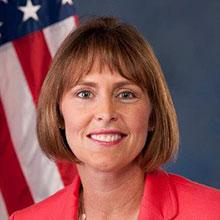
Rep. Kathy Castor (FL-14) is the chair of the U.S. House Select Committee on the Climate Crisis, which unveiled its 500-plus-page Climate Crisis Action Plan over the summer to give Congress a roadmap for solving the climate crisis. Castor is a longtime national leader on protecting the environment and finding climate solutions. In 2019, she was the lead sponsor of the Climate Action Now Act (H.R. 9), the first major climate bill to pass the House of Representatives in a decade. She started her professional career enforcing environmental and growth management laws in Florida, helping protect the state’s coastline, wetlands and endangered species. A Democrat, Castor was first elected in 2006, when she became the first woman to represent the Tampa Bay area in Congress.
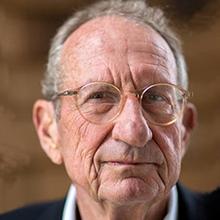
John Deutch is an Institute Professor Emeritus at the Massachusetts Institute of Technology. Mr. Deutch has been a member of the MIT faculty since 1970, and has served as Chairman of the Department of Chemistry, Dean of Science, and Provost. Mr. Deutch has published over 160 technical publications in physical chemistry, as well as numerous publications on technology, energy, international security, and public policy issues.
John Deutch served as Director of Central Intelligence from May 1995-December 1996. From 1994-1995, he served as Deputy Secretary of Defense and served as Undersecretary of Defense for Acquisition and Technology from 1993-1994. John Deutch has also served as Director of Energy Research (1977-1979), Acting Assistant Secretary for Energy Technology (1979), and Undersecretary (1979-1980) in the United States Department of Energy.
In addition, John Deutch has served on the President’s Nuclear Safety Oversight Committee (1980-1981); the President’s Commission on Strategic Forces (1983); the White House Science Council (1985-1989); the President’s Foreign Intelligence Advisory Board (1990-1993); the President’s Commission on Aviation Safety and Security (1996); the President’s Commission on Reducing and Protecting Government Secrecy (1996-1997); and as Chairman of the Commission to Assess the Organization of the Federal Government to Combat the Proliferation of Weapons of Mass Destruction (1998-1999). He was a member of the President’s Committee of Advisors on Science and Technology (1997-2001) and a member of the National Petroleum Council (2008-2018). He received the Aspen Strategy Group Leadership Award in 2004 and was the Phi Beta Kappa “Orator” at Harvard University, 2005. He is a member of the American Philosophical Society. In 2009 John Deutch received the MIT Gordon Y. Billard award: “... for special service of outstanding merit performed for the Institute.” He was a member of the Secretary of Energy Advisory Board (2012-2017) and chair (2014-2017).
He has served on the board of directors of Cheniere, Citigroup, CMS, Cummins, Raytheon, Schlumberger, and SAIC and as a Trustee or Director of the Museum of Fine Arts, Boston; Massachusetts General Hospital Physicians Organization, Center for American Progress, the Council on Foreign Relations, Resources for the Future, the Skolkovo Institute of Science and Technology, and the Urban Institute.
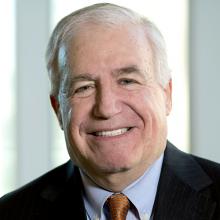
Paul Joskow is the Elizabeth and James Killian Professor of Economics emeritus at the Massachusetts Institute of Technology (MIT) where he joined the faculty in 1972. He has served as Chairman of the Department of Economics and as Director of the Center for Energy and Environmental Policy Research. From 2008 to 2017 he was the president of the Alfred P. Sloan Foundation. He is a Fellow of the American Academy of Arts and Sciences and the Econometric Society, and a Distinguished Fellow of the American Economic Association and of the Industrial Organization Society. Paul Joskow has published widely on topics in industrial organization, energy economics, electricity markets, and government regulation.
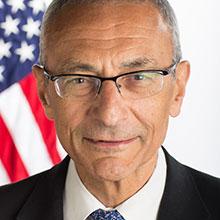
John Podesta is the founder and a member of the Board of Directors for the Washington, D.C.-based think tank Center for American Progress and a founder and Chair of the Board of the Washington Center for Equitable Growth.
Podesta served as counselor to President Barack Obama, where he was responsible for coordinating the administration’s climate policy and initiatives. In 2008, he served as co-chair of President Obama’s transition team, where he coordinated the priorities of the incoming administration’s agenda and spearheaded its appointments of cabinet secretaries and senior political appointees. Podesta served as White House Chief of Staff to President William J. Clinton, where he was a member of the president's cabinet and served on the National Security Council. Additionally, Podesta has held numerous positions on Capitol Hill, including counselor to Democratic Leader Sen. Thomas A. Daschle (1995-1996) and served on the President’s Global Development Council and the UN Secretary General’s High-Level Panel of Eminent Persons on the Post-2015 Development Agenda. In 2016, Podesta chaired Hillary Clinton’s campaign for president.
A Chicago native, Podesta is a graduate of Knox College and the Georgetown University Law Center, where he is currently a visiting professor of law and is a senior fellow at Yale University's Jackson Institute for Global Affairs.
He is the author of The Power of Progress: How America’s Progressives Can (Once Again) Save Our Economy, Our Climate and Our Country.
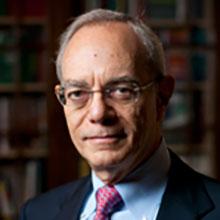
Since July 2012, Rafael Reif has served as the 17th president of the Massachusetts Institute of Technology (MIT). He leads MIT’s pioneering efforts to help redefine the future of higher education in response to the Covid-19 pandemic and its economic consequences, with a commitment to advancing diversity, equity and inclusion. A champion for both fundamental science and MIT’s signature style of interdisciplinary, problem-centered research, he is also pursuing an aggressive agenda to encourage innovation and entrepreneurship.
In education, his central focus has been the development of MITx and edX, which he spearheaded in his previous role as MIT’s provost. While fostering the rapid growth of the open online learning platform edX, he charged the Institute-wide Task Force on the Future of MIT Education, which spurred rapid adoption of blended learning models in MIT classrooms and the introduction of the MicroMasters credential from MITx, the Institute’s portfolio of massive open online courses.
In keeping with MIT’s mission to “bring knowledge to bear on the world’s great challenges,” in May 2014, Dr. Reif launched the MIT Environmental Solutions Initiative, and in October 2015, Dr. Reif and his leadership team issued MIT’s Plan for Action on Climate Change, centered on research, education, campus sustainability and a strategy of industry engagement.
To enhance MIT’s innovation ecosystem and equip the next generation of innovators to drive their ideas to impact, in October 2016 Dr. Reif launched The Engine, an accelerator specially geared to help “tough tech” ventures deliver innovations that address humanity’s great challenges. Additional efforts include the MIT Innovation Initiative, the MIT Hong Kong Innovation Node, a new minor in Entrepreneurship and Innovation, and the MIT Sandbox Innovation Fund Program.
To accelerate research and innovation at the nanoscale, MIT constructed MIT.nano, a major new facility at the heart of campus. And because MIT’s entrepreneurial ecosystem extends well beyond the campus, Dr. Reif is leading an ambitious, decade-long redevelopment initiative in Kendall Square.
To advance the frontier of human and machine intelligence to accelerate the invention of artificial intelligence tools for every discipline, in February 2018, Dr. Reif announced the MIT Quest for Intelligence. That same month saw the start of the MIT Task Force on the Work of the Future. And in October 2018, in response to the ubiquity of computing and the rise of AI across disciplines, he announced the MIT Stephen A. Schwarzman College of Computing, the most significant reshaping of MIT since the 1950s.
A member of the MIT faculty since 1980, Dr. Reif has served as director of MIT’s Microsystems Technology Laboratories, as associate department head for Electrical Engineering, as head of the Department of Electrical Engineering and Computer Science (EECS), and as provost. An elected member of the American Academy of Arts and Sciences, the National Academy of Engineering and the Chinese Academy of Engineering, he is the inventor or co-inventor on 13 patents, has edited or co-edited five books and has supervised 38 doctoral theses. He received the degree of Ingeniero Eléctrico from Universidad de Carabobo, Valencia, Venezuela, and his doctorate in electrical engineering from Stanford University.
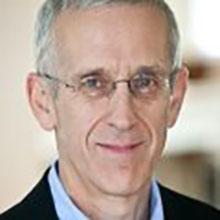
Todd Stern is a nonresident senior fellow at the Brookings Institution concentrating on climate change. Stern served from January 2009 until April 2016, as the special envoy for climate change at the Department of State. He was President Obama’s chief climate negotiator, leading the U.S. effort in negotiating the Paris Agreement and in all bilateral and multilateral climate negotiations in the seven years leading up to Paris. Stern also participated in the development of U.S. domestic climate and clean energy policy.
Stern is currently focused on writing about the climate negotiations during his time as special envoy as well as on writing, speaking, and advising about ongoing efforts on climate change at both the international and domestic levels.
Stern served under President Clinton in the White House from 1993 to 1999, mostly as assistant to the president and staff secretary. From 1997 to 1999, he coordinated the administration’s initiative on global climate change, acting as the senior White House negotiator at the Kyoto and Buenos Aires negotiations. From 1999 to 2001, Stern served as counselor to Secretary of the Treasury Lawrence Summers, advising the secretary on the policy and politics of a broad range of economic and financial issues, and supervising Treasury’s anti-money laundering strategy.


